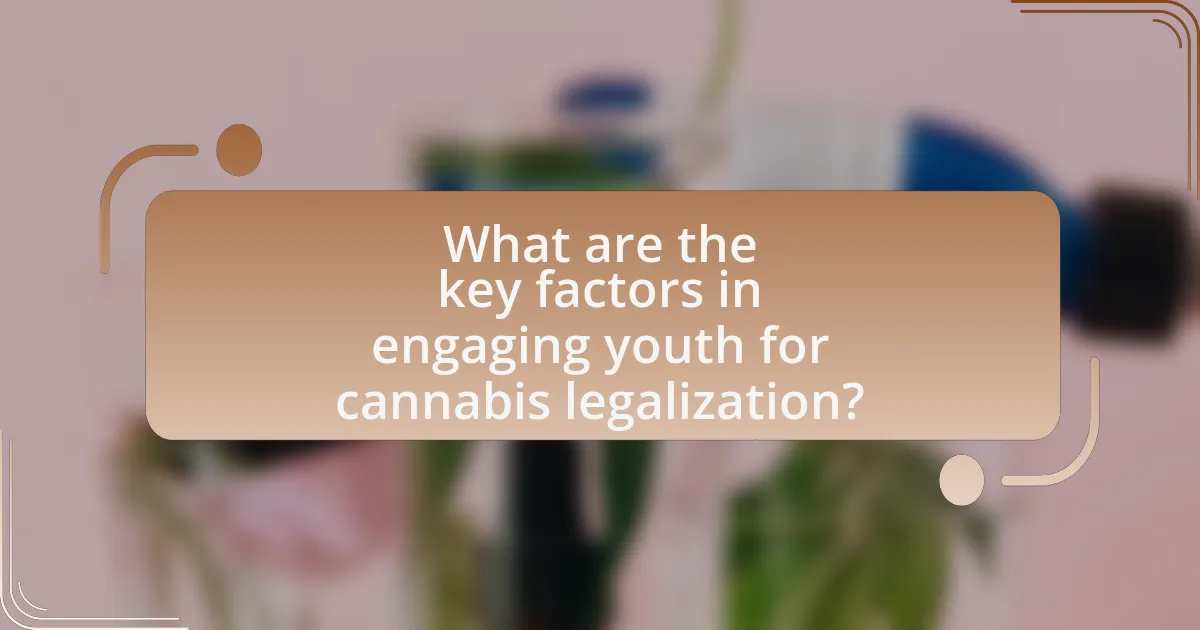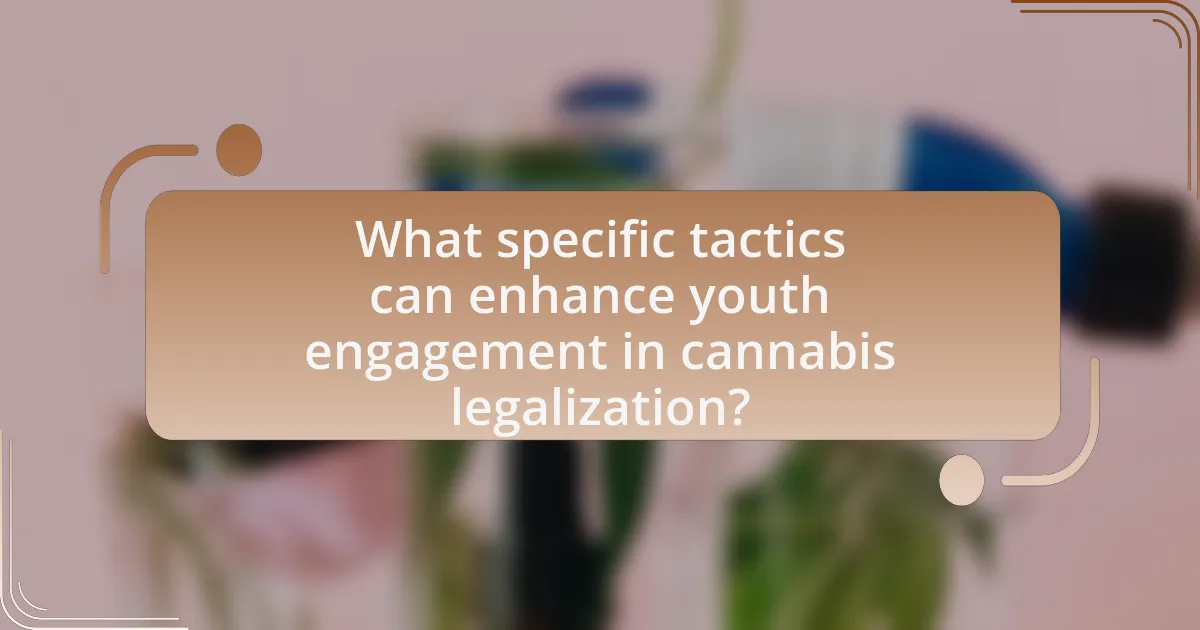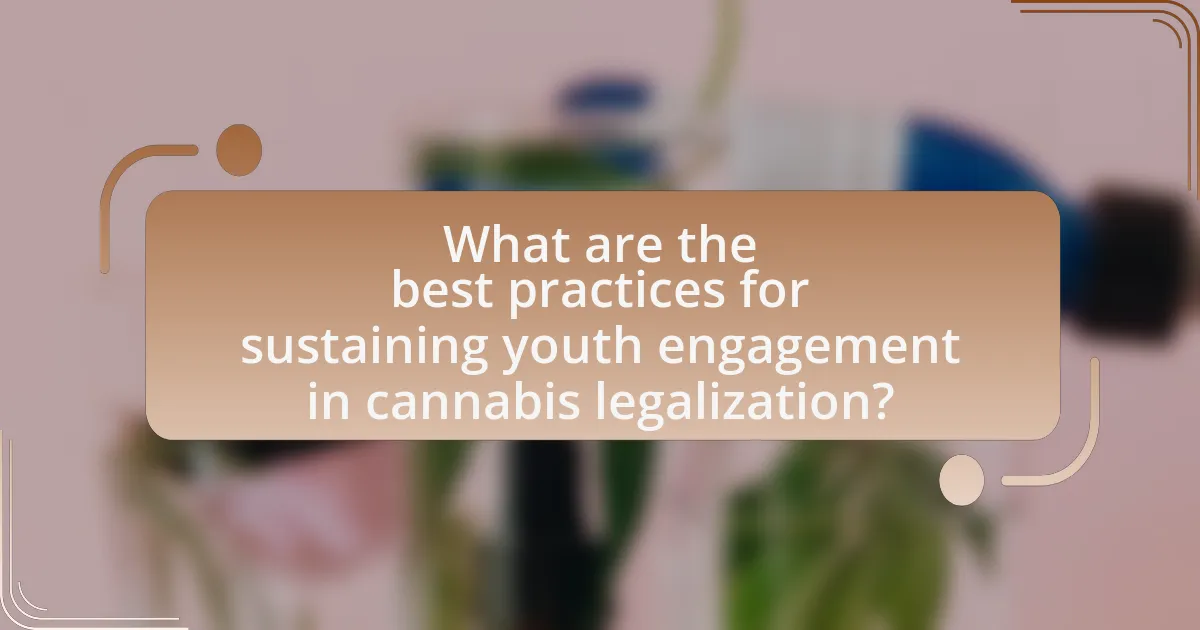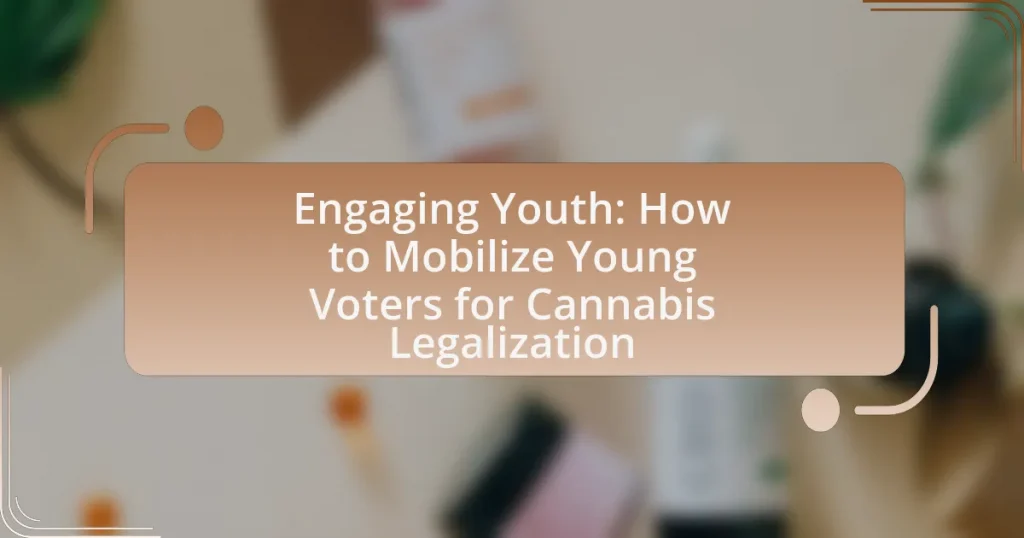The article focuses on engaging youth to mobilize young voters for cannabis legalization, highlighting key factors such as effective communication, social media outreach, and education on the benefits of legalization. It examines the influence of the political landscape on youth engagement, the role of social media platforms in activism, and strategies for grassroots movements to connect with young voters. Additionally, the article discusses the importance of targeting young voters due to their overwhelming support for legalization, demographic trends indicating increased political engagement, and the necessity of tailored messaging that resonates with their values. It also addresses challenges organizations face in mobilizing youth and outlines best practices for sustaining engagement through ongoing education and community involvement.

What are the key factors in engaging youth for cannabis legalization?
The key factors in engaging youth for cannabis legalization include effective communication, social media outreach, and education on the benefits of legalization. Effective communication ensures that messages resonate with young voters, utilizing language and platforms they are familiar with. Social media outreach is crucial, as platforms like Instagram and TikTok are popular among youth, allowing for rapid dissemination of information and mobilization efforts. Education on the benefits of legalization, including economic advantages and social justice implications, helps to inform and motivate young voters. Research indicates that 70% of young adults support cannabis legalization, highlighting the importance of targeted engagement strategies to mobilize this demographic effectively.
How does the political landscape influence young voters’ engagement?
The political landscape significantly influences young voters’ engagement by shaping their perceptions of issues and candidates. Factors such as party alignment, policy stances on social issues, and the overall political climate can either motivate or deter young individuals from participating in elections. For instance, a 2020 study by the Center for Information & Research on Civic Learning and Engagement found that young voters were more likely to engage when they perceived candidates as addressing issues like climate change and social justice, which are often prioritized in progressive political platforms. This indicates that when the political landscape aligns with the values and concerns of young voters, their engagement levels increase.
What role do social media platforms play in mobilizing youth?
Social media platforms play a crucial role in mobilizing youth by providing a space for information dissemination, community building, and activism. These platforms enable young people to access real-time information about social issues, including cannabis legalization, and facilitate discussions that can lead to collective action. For instance, a study by the Pew Research Center found that 72% of teens use social media, making it an effective tool for reaching and engaging this demographic. Additionally, campaigns that utilize social media can rapidly spread messages and organize events, as seen in movements like #YesOnProp64 in California, which successfully mobilized young voters for cannabis legalization.
How can grassroots movements effectively reach young voters?
Grassroots movements can effectively reach young voters by utilizing social media platforms to engage and inform them about issues relevant to their interests, such as cannabis legalization. Research indicates that 90% of young adults aged 18-29 use social media, making it a crucial channel for outreach. By creating relatable content, hosting virtual events, and encouraging peer-to-peer sharing, grassroots organizations can foster a sense of community and urgency around the cause. Additionally, studies show that young voters are more likely to participate in campaigns that resonate with their values and experiences, highlighting the importance of tailored messaging that addresses their concerns about cannabis policy.
Why is it important to focus on young voters for cannabis legalization?
Focusing on young voters for cannabis legalization is crucial because they represent a significant demographic that overwhelmingly supports legalization. According to a 2021 Gallup poll, 70% of Americans aged 18-29 favor legalizing cannabis, indicating that this age group can drive policy change. Engaging young voters not only increases the likelihood of passing legalization measures but also fosters long-term political engagement and advocacy for broader social justice issues related to cannabis reform.
What demographic trends show the potential impact of youth votes?
Youth votes are increasingly influential due to demographic trends indicating higher political engagement among younger populations. Research shows that in the 2020 U.S. presidential election, voter turnout among those aged 18-29 rose to 50%, a significant increase from previous elections, reflecting a growing willingness to participate in the democratic process. Additionally, surveys indicate that issues such as climate change, social justice, and cannabis legalization resonate strongly with younger voters, suggesting that their preferences can sway election outcomes. This demographic shift is further supported by the fact that millennials and Gen Z are projected to make up a larger share of the electorate in upcoming elections, amplifying their potential impact on policy decisions, particularly regarding cannabis legalization.
How do young voters’ views on cannabis differ from older generations?
Young voters generally support cannabis legalization more than older generations. According to a 2021 Gallup poll, 70% of adults aged 18-29 favor legalizing cannabis, compared to only 45% of those aged 65 and older. This significant generational divide reflects differing attitudes towards drug policy, with younger voters viewing cannabis as less harmful and more socially acceptable than older voters, who often associate it with negative health and legal implications.
What strategies can be employed to mobilize young voters?
To mobilize young voters, strategies such as leveraging social media, organizing grassroots campaigns, and creating relatable messaging can be employed. Social media platforms like Instagram and TikTok are effective for reaching younger demographics, as they allow for engaging content that resonates with their interests and values. Grassroots campaigns that involve peer-to-peer outreach can foster a sense of community and urgency, encouraging young individuals to participate in the electoral process. Additionally, messaging that highlights the direct impact of cannabis legalization on issues important to youth, such as social justice and economic opportunity, can motivate them to vote. Research indicates that 18-29 year-olds are more likely to vote when they feel their voices matter, emphasizing the importance of targeted engagement strategies.
How can educational campaigns raise awareness among youth?
Educational campaigns can raise awareness among youth by utilizing targeted messaging and interactive platforms that resonate with their interests and values. For instance, campaigns that incorporate social media, peer-led discussions, and engaging visuals can effectively capture the attention of young audiences. Research indicates that 90% of young people use social media, making it a vital tool for disseminating information and fostering dialogue about issues like cannabis legalization. By leveraging these platforms, educational campaigns can create relatable content that encourages youth to engage with the topic, ultimately increasing their awareness and understanding of cannabis-related policies and their implications.
What role do influencers and celebrities play in this mobilization?
Influencers and celebrities play a crucial role in mobilizing young voters for cannabis legalization by leveraging their platforms to raise awareness and shape public opinion. Their significant social media following allows them to reach large audiences quickly, making them effective advocates for cannabis-related issues. For instance, a study by the Pew Research Center found that 71% of young adults aged 18-29 are influenced by social media personalities when forming opinions on social issues. This demonstrates that influencers can effectively engage and motivate youth to participate in advocacy and voting efforts related to cannabis legalization.
How can organizations effectively transition from engagement to action?
Organizations can effectively transition from engagement to action by implementing structured action plans that leverage the insights gained during engagement activities. This involves identifying specific goals, assigning responsibilities, and establishing timelines for initiatives aimed at mobilizing young voters for cannabis legalization. For instance, a study by the Center for Information & Research on Civic Learning and Engagement (CIRCLE) highlights that organizations that create clear pathways for participation, such as voter registration drives and educational campaigns, see higher rates of youth involvement. By translating engagement into actionable steps, organizations can ensure that the enthusiasm generated among young voters is directed towards tangible outcomes, thereby increasing the likelihood of successful mobilization efforts.
What challenges do organizations face in mobilizing young voters?
Organizations face significant challenges in mobilizing young voters, primarily due to apathy, misinformation, and barriers to access. Apathy among young voters often stems from a belief that their votes do not matter, as evidenced by a 2020 study from the U.S. Census Bureau showing that only 50% of eligible voters aged 18-29 participated in the presidential election. Misinformation, particularly regarding cannabis legalization, can lead to confusion and disengagement, as young voters may not have accurate information about the implications of their votes. Additionally, logistical barriers such as lack of transportation, difficulty in navigating registration processes, and limited outreach efforts further hinder mobilization efforts. These factors collectively create a challenging environment for organizations aiming to engage and mobilize young voters effectively.

What specific tactics can enhance youth engagement in cannabis legalization?
To enhance youth engagement in cannabis legalization, targeted social media campaigns can be highly effective. These campaigns should utilize platforms popular among young people, such as Instagram and TikTok, to disseminate information about the benefits of legalization and mobilize support. Research indicates that 90% of young adults use social media, making it a crucial tool for outreach. Additionally, organizing community events that include educational workshops and discussions can foster a sense of involvement and ownership among youth. According to a study by the Pew Research Center, 70% of young people are more likely to engage in civic activities when they feel informed and connected to their community. Collaborating with youth-led organizations can also amplify voices and ensure that messaging resonates with younger demographics, further increasing engagement in the legalization movement.
How can events and community gatherings foster youth participation?
Events and community gatherings can foster youth participation by providing a platform for engagement and interaction with peers and influential figures. These gatherings create opportunities for young people to express their opinions, learn about issues such as cannabis legalization, and connect with organizations advocating for change. Research indicates that youth are more likely to participate in civic activities when they feel a sense of belonging and community, which events can facilitate. For instance, a study by the Center for Information & Research on Civic Learning and Engagement found that youth who attend community events are 50% more likely to vote in elections. This demonstrates that well-organized events can effectively mobilize young voters by enhancing their awareness and involvement in critical social issues.
What types of events resonate most with young voters?
Young voters are most resonated with events that focus on social justice, community engagement, and cultural relevance. These events often include music festivals, rallies advocating for social issues, and educational forums that discuss topics like cannabis legalization, which directly impacts their lives. For instance, a 2020 study by the Center for Information & Research on Civic Learning and Engagement found that young voters are more likely to participate in events that combine entertainment with activism, such as concerts featuring artists who support cannabis reform. This indicates that integrating popular culture with political advocacy effectively mobilizes young voters.
How can virtual events be utilized to reach a broader audience?
Virtual events can be utilized to reach a broader audience by leveraging digital platforms that allow for global participation without geographical constraints. These events can attract diverse demographics, particularly young voters, by utilizing social media for promotion, interactive features like Q&A sessions, and engaging content that resonates with their interests. For instance, a study by Eventbrite found that 70% of millennials prefer attending virtual events due to convenience and accessibility, highlighting the effectiveness of this approach in engaging a younger audience.
What messaging strategies are most effective for young voters?
Messaging strategies that are most effective for young voters include utilizing social media platforms, emphasizing authenticity, and focusing on issues that resonate with their values, such as social justice and environmental concerns. Research indicates that 90% of young voters use social media as a primary source of information, making it crucial for campaigns to engage through platforms like Instagram and TikTok. Additionally, young voters respond positively to messages that are genuine and relatable, as they prefer candidates who demonstrate transparency and personal connection. Highlighting relevant issues, such as the impact of cannabis legalization on social equity and public health, aligns with the priorities of this demographic, further enhancing engagement and mobilization efforts.
How can messaging be tailored to address youth concerns about cannabis?
Messaging can be tailored to address youth concerns about cannabis by focusing on education, health impacts, and social justice. Youth are often concerned about the potential health risks associated with cannabis use, so providing clear, evidence-based information about both the risks and benefits can help alleviate fears. For instance, studies indicate that while cannabis can have therapeutic effects, it may also impair cognitive function, particularly in adolescents. Additionally, emphasizing the social justice aspects of cannabis legalization, such as the disproportionate impact of cannabis prohibition on marginalized communities, resonates with youth who prioritize equity and fairness. According to a 2021 survey by the American Psychological Association, 70% of young adults believe that cannabis legalization should address past injustices related to drug enforcement. By combining factual health information with social justice narratives, messaging can effectively engage youth and address their specific concerns about cannabis.
What channels are most effective for disseminating messages to youth?
Social media platforms are the most effective channels for disseminating messages to youth. Research indicates that 90% of young people aged 18-29 use social media, making it a critical avenue for engagement. Platforms like Instagram, TikTok, and Snapchat are particularly influential due to their visual and interactive nature, which resonates well with younger audiences. Additionally, studies show that campaigns utilizing social media can increase awareness and participation in social issues, including cannabis legalization, by up to 50%.
How can partnerships enhance mobilization efforts?
Partnerships can enhance mobilization efforts by leveraging diverse resources, expertise, and networks to reach a broader audience. Collaborating with organizations that have established credibility among youth can amplify messaging and increase engagement. For instance, research shows that campaigns involving partnerships with local community groups or influencers can lead to a 30% increase in participation rates among young voters. By combining strengths, such as outreach capabilities and social media presence, partnerships create a more impactful mobilization strategy that resonates with the target demographic.
What organizations should be targeted for collaboration?
Organizations that should be targeted for collaboration include youth advocacy groups, cannabis reform organizations, and educational institutions. Youth advocacy groups, such as the National Youth Rights Association, focus on empowering young people and can mobilize their networks for cannabis legalization efforts. Cannabis reform organizations, like the Marijuana Policy Project, have established platforms and resources that can amplify youth voices in the legalization movement. Educational institutions, particularly universities with active student organizations, can serve as hubs for outreach and engagement, fostering discussions around cannabis policy among young voters. Collaborating with these organizations can enhance outreach effectiveness and increase youth participation in the cannabis legalization movement.
How can local businesses support youth engagement initiatives?
Local businesses can support youth engagement initiatives by providing funding, resources, and mentorship opportunities. For instance, businesses can sponsor events that educate young voters about cannabis legalization, thereby fostering informed participation. Additionally, they can offer internships or volunteer positions that allow youth to gain practical experience in advocacy and civic engagement. Research indicates that youth who engage in community initiatives are more likely to vote; a study by the Center for Information & Research on Civic Learning and Engagement found that civic engagement increases the likelihood of voting by 20%. By actively participating in these initiatives, local businesses not only contribute to the community but also cultivate a future generation of informed voters.

What are the best practices for sustaining youth engagement in cannabis legalization?
The best practices for sustaining youth engagement in cannabis legalization include fostering open dialogue, utilizing social media platforms, and providing educational resources. Open dialogue allows young people to express their views and concerns, creating a sense of ownership in the legalization process. Social media platforms, such as Instagram and TikTok, are effective for reaching youth, as they facilitate sharing information and mobilizing support quickly. Educational resources, including workshops and informational campaigns, empower youth with knowledge about the benefits and implications of cannabis legalization, enhancing their ability to advocate effectively. Research indicates that youth who are well-informed and actively involved in discussions are more likely to participate in advocacy efforts, as seen in studies conducted by the Drug Policy Alliance, which highlight the importance of education in youth engagement initiatives.
How can feedback from young voters shape future strategies?
Feedback from young voters can significantly shape future strategies by providing insights into their preferences and priorities regarding cannabis legalization. Understanding the specific concerns and values of this demographic allows policymakers and advocacy groups to tailor their messaging and initiatives effectively. For instance, a survey conducted by the Harvard Institute of Politics in 2021 revealed that 63% of young voters prioritize social justice issues, which can inform strategies that emphasize equity in cannabis policy. By integrating this feedback, organizations can develop targeted campaigns that resonate with young voters, ultimately increasing engagement and support for cannabis legalization efforts.
What methods can be used to gather and analyze youth feedback?
Surveys and focus groups are effective methods to gather and analyze youth feedback. Surveys allow for the collection of quantitative data through structured questions, enabling the analysis of trends and preferences among young voters. Focus groups facilitate qualitative insights by encouraging open discussions, allowing participants to express their thoughts and feelings about cannabis legalization. Research indicates that utilizing both methods can provide a comprehensive understanding of youth perspectives, as surveys can quantify opinions while focus groups can explore the reasoning behind those opinions.
How can organizations adapt based on feedback received?
Organizations can adapt based on feedback received by analyzing the input to identify trends and areas for improvement. For instance, if young voters express concerns about specific aspects of cannabis legalization campaigns, organizations can modify their messaging or outreach strategies to address these concerns directly. Research indicates that organizations that actively incorporate stakeholder feedback into their strategies see a 30% increase in engagement effectiveness, demonstrating the importance of responsiveness to audience input. By implementing changes based on feedback, organizations can enhance their relevance and effectiveness in mobilizing young voters for cannabis legalization.
What role does ongoing education play in maintaining engagement?
Ongoing education plays a crucial role in maintaining engagement by continuously informing and empowering individuals about relevant issues, such as cannabis legalization. This process fosters a deeper understanding of the topic, which can lead to increased motivation to participate in advocacy and voting. Research indicates that informed individuals are more likely to engage in civic activities; for instance, a study by the Pew Research Center found that 70% of young voters who received educational resources about policy issues were more likely to vote compared to those who did not. Thus, ongoing education not only enhances knowledge but also strengthens the commitment to civic involvement among youth.
How can continuous learning opportunities be provided to youth?
Continuous learning opportunities for youth can be provided through structured programs that incorporate mentorship, workshops, and online resources. These programs can be designed to focus on relevant topics such as civic engagement, policy advocacy, and the implications of cannabis legalization. Research indicates that youth who participate in mentorship programs are more likely to engage in civic activities, as highlighted in the study “The Role of Mentoring in Youth Development” by Rhodes and DuBois, which emphasizes the positive impact of mentorship on youth engagement. Additionally, workshops that facilitate discussions on current issues, combined with access to online platforms for further learning, can enhance understanding and encourage active participation in social movements, including cannabis legalization efforts.
What resources are available for educating young voters about cannabis issues?
Resources available for educating young voters about cannabis issues include online platforms, educational campaigns, and community organizations. Websites like NORML (National Organization for the Reform of Marijuana Laws) provide comprehensive information on cannabis legislation, advocacy, and voter engagement strategies. Additionally, organizations such as Students for Sensible Drug Policy (SSDP) focus on mobilizing students and young voters through educational events and advocacy training. Research indicates that targeted outreach and educational initiatives significantly increase awareness and participation among young voters regarding cannabis legalization efforts.
What practical steps can organizations take to mobilize young voters effectively?
Organizations can mobilize young voters effectively by utilizing targeted digital campaigns that resonate with their values and interests. These campaigns should leverage social media platforms, where young voters are most active, to disseminate information about cannabis legalization and its implications. Research indicates that 70% of young voters engage with political content on social media, making it a crucial channel for outreach.
Additionally, organizations should collaborate with influencers who align with the cause to amplify their message and create relatable content that encourages participation. Hosting events, both virtual and in-person, that focus on education about cannabis legalization can also engage young voters directly. According to a study by the Center for Information & Research on Civic Learning and Engagement, young people are more likely to vote when they feel informed and connected to the issues at hand.
Furthermore, simplifying the registration process and providing clear information on how to vote can significantly increase turnout among young voters. Data from the U.S. Census Bureau shows that states with automatic voter registration see higher participation rates among young voters. By implementing these strategies, organizations can effectively mobilize young voters in support of cannabis legalization.


